2011年全国中考英语八大时态试题汇编之三——现在完成时和过去完成时
初中英语八大时态结构及用法
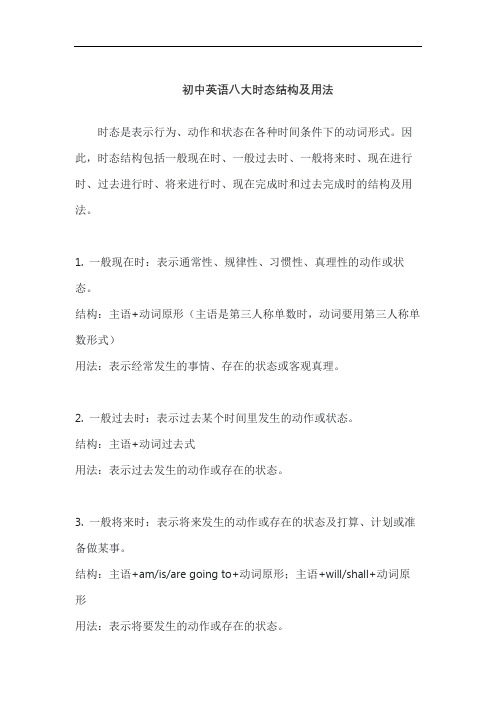
初中英语八大时态结构及用法时态是表示行为、动作和状态在各种时间条件下的动词形式。
因此,时态结构包括一般现在时、一般过去时、一般将来时、现在进行时、过去进行时、将来进行时、现在完成时和过去完成时的结构及用法。
1. 一般现在时:表示通常性、规律性、习惯性、真理性的动作或状态。
结构:主语+动词原形(主语是第三人称单数时,动词要用第三人称单数形式)用法:表示经常发生的事情、存在的状态或客观真理。
2. 一般过去时:表示过去某个时间里发生的动作或状态。
结构:主语+动词过去式用法:表示过去发生的动作或存在的状态。
3. 一般将来时:表示将来发生的动作或存在的状态及打算、计划或准备做某事。
结构:主语+am/is/are going to+动词原形;主语+will/shall+动词原形用法:表示将要发生的动作或存在的状态。
4. 现在进行时:表示现阶段或说话时正在进行的动作及行为。
结构:主语+am/is/are+现在分词用法:表示正在进行的动作。
5. 过去进行时:表示过去某段时间或某一时刻正在发生或进行的动作或行为。
结构:主语+was/were+现在分词用法:表示过去正在进行的动作。
6. 将来进行时:表示将来某一时刻正在进行的动作,或表示要在将来某一时刻开始,并继续下去的动作。
结构:主语+shall/will+be+现在分词用法:表示将来正在进行的动作。
7. 现在完成时:表示过去发生的动作对现在造成的影响或结果,或表示过去的动作或状态持续到现在。
结构:主语+have/has+过去分词用法:表示已经完成的动作或存在的状态。
8. 过去完成时:表示在过去某一时刻或动作以前已经完成了的动作或存在的状态。
结构:主语+had+过去分词用法:表示过去已经完成的动作。
中考英语-八大时态的基本时态练习(含答案)
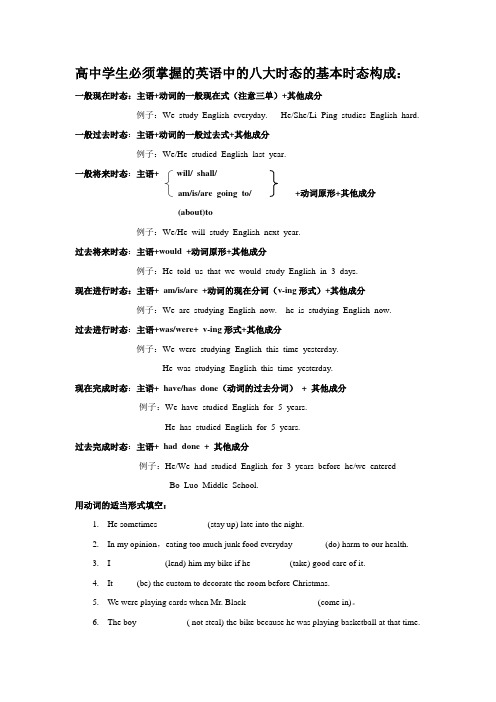
高中学生必须掌握的英语中的八大时态的基本时态构成:一般现在时态:主语+动词的一般现在式(注意三单)+其他成分例子:We study English everyday. He/She/Li Ping studies English hard. 一般过去时态:主语+动词的一般过去式+其他成分例子:We/He studied English last year.一般将来时态:主语+ will/ shall/am/is/are going to/ +动词原形+其他成分(about)to例子:We/He will study English next year.过去将来时态:主语+would +动词原形+其他成分例子:He told us that we would study English in 3 days.现在进行时态:主语+ am/is/are +动词的现在分词(v-ing形式)+其他成分例子:We are studying English now. he is studying English now.过去进行时态:主语+was/were+ v-ing形式+其他成分例子:We were studying English this time yesterday.He was studying English this time yesterday.现在完成时态:主语+ have/has done(动词的过去分词)+ 其他成分例子:We have studied English for 5 years.He has studied English for 5 years.过去完成时态:主语+ had done + 其他成分例子:He/We had studied English for 3 years before he/we enteredBo Luo Middle School.用动词的适当形式填空:1.He sometimes ___________(stay up) late into the night.2.In my opinion,eating too much junk food everyday _______(do) harm to our health.3.I ____________(lend) him my bike if he_________(take) good care of it.4.It _____(be) the custom to decorate the room before Christmas.5.We were playing cards when Mr. Black ________________(come in)。
中考常考的八大时态

中考常考的八大时态中考英语常考的八大时态主要包括:一般现在时、一般过去时、一般将来时、现在进行时、过去进行时、现在完成时、过去完成时和将来完成时。
下面我们来详细看一下这些时态的具体应用和标志:1.一般现在时:表示经常发生的情况;有规律出现的情况;总是发生的;事实真理。
时间状语常常包括Always, usually, often, sometimes等,基本结构是主语+动词原形(如主语为第三人称单数,动词上要改为第三人称单数形式)。
否定形式为主语+am / is / are+not+其他。
例如:“She often speaks English.”表示经常性或习惯性的动作。
2.一般过去时:表示过去发生的动作或状态。
常与表示过去的时间状语连用,如:last year, yesterday等。
3.一般将来时:表示将要发生的动作或状态,常与表示将来的时间状语连用,如:tomorrow, next year等。
4.现在进行时:表示现在正在进行的动作,常与now, at the moment等时间状语连用。
5.过去进行时:表示过去某一时刻正在进行的动作,常与at this time yesterday, at that moment等时间状语连用。
6.现在完成时:表示过去发生的动作对现在造成的影响或结果,常与already, yet, just等副词连用。
7.过去完成时:表示在过去某一时间之前已经发生的动作,常与before, by the time等引导的短语或从句连用。
8.将来完成时:表示在将来某一时间之前将要完成的动作,常与by the time等引导的短语或从句连用。
英语八大时态总结
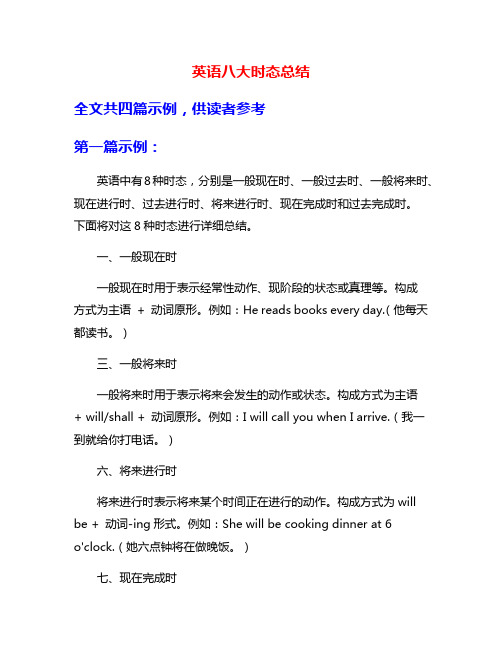
英语八大时态总结全文共四篇示例,供读者参考第一篇示例:英语中有8种时态,分别是一般现在时、一般过去时、一般将来时、现在进行时、过去进行时、将来进行时、现在完成时和过去完成时。
下面将对这8种时态进行详细总结。
一、一般现在时一般现在时用于表示经常性动作、现阶段的状态或真理等。
构成方式为主语+ 动词原形。
例如:He reads books every day.(他每天都读书。
)三、一般将来时一般将来时用于表示将来会发生的动作或状态。
构成方式为主语+ will/shall + 动词原形。
例如:I will call you when I arrive.(我一到就给你打电话。
)六、将来进行时将来进行时表示将来某个时间正在进行的动作。
构成方式为will be + 动词-ing形式。
例如:She will be cooking dinner at 6o'clock.(她六点钟将在做晚饭。
)七、现在完成时现在完成时用于表示过去某个时间开始的动作一直持续到现在,并可能继续发生。
构成方式为主语+ have/has + 过去分词。
例如:He has lived here for 5 years.(他在这里住了5年了。
)总结:1. 一般现在时表示经常性动作、现阶段的状态或真理。
2. 一般过去时表示过去某个时间发生的动作或状态。
3. 一般将来时表示将来会发生的动作或状态。
4. 现在进行时表示现在进行的动作或状态。
5. 过去进行时表示过去某个时间正在进行的动作。
6. 将来进行时表示将来某个时间将会进行的动作。
7. 现在完成时表示过去某个时间开始的动作一直持续到现在。
8. 过去完成时表示过去某个时间之前发生的动作。
掌握这8种时态的用法及构成方式对于学习英语语法和提高英语水平非常重要。
希望以上总结对您有所帮助。
第二篇示例:英语八大时态是学习英语语法非常重要的内容之一,掌握好各种时态的用法可以帮助我们更准确地表达自己的意思。
初中英语语法八大时态总结及练习题
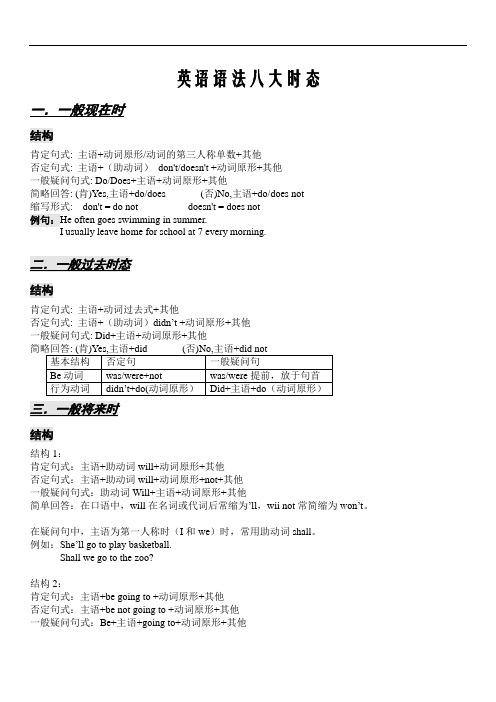
英语语法八大时态一.一般现在时结构肯定句式: 主语+动词原形/动词的第三人称单数+其他否定句式: 主语+(助动词)don't/doesn't +动词原形+其他一般疑问句式: Do/Does+主语+动词原形+其他简略回答: (肯)Yes,主语+do/does (否)No,主语+do/does not缩写形式: don't = do not doesn't = does not例句:He often goes swimming in summer.I usually leave home for school at 7 every morning.二.一般过去时态结构肯定句式: 主语+动词过去式+其他否定句式: 主语+(助动词)didn’t +动词原形+其他一般疑问句式: Did+主语+动词原形+其他基本结构否定句一般疑问句Be动词was/were+not was/were提前,放于句首行为动词didn’t+do(动词原形)Did+主语+do(动词原形)三.一般将来时结构结构1:肯定句式:主语+助动词will+动词原形+其他否定句式:主语+助动词will+动词原形+not+其他一般疑问句式:助动词Will+主语+动词原形+其他简单回答:在口语中,will在名词或代词后常缩为’ll,wii not常简缩为won’t。
在疑问句中,主语为第一人称时(I和we)时,常用助动词shall。
例如:She’ll go to play basketball.Shall we go to the zoo?结构2:肯定句式:主语+be going to +动词原形+其他否定句式:主语+be not going to +动词原形+其他一般疑问句式:Be+主语+going to+动词原形+其他简略回答:(肯)Yes,主语+be (否)No,主语+be not将来时其他表示法1)be going to表示将来表示说话人的打算、计划、安排或根据迹象判断必然或很可能发生的事情。
高中英语最实用语法一般过去时、现在完成时、将来完成时讲解和经典习题

I. 一般过去时一般过去时:在过去发生的动作,现在已经结束。
基本用法:1.过去某个特定时间发生的动作或存在的状态。
表示过去时间的时间状语:last+时间、时间+ago、yesterday、just now、the other day、once upon a time、at that time、then2. 表示过去经常发生的动作或存在的状态,可与频度副词always、usually、often等连用。
表示过去的习惯性动作,除了用动词过去式外,还可以用used to do sth、would do sth3.表示说话人始料未及的事情I didn’t know it was you.I never thought you would bring me a gift.4.宾语从句时态:主现从、主过从5.表示已去世者的情况或过去的历史。
II. 现在完成时一.基本结构:助动词have/has+过去分词(done)二.句型:否定句:主语+have/has+not+过去分词+其他.一般疑问句:Have/Has+主语+过去分词+其他.简略答语: Yes, 主语+ have/has.(肯定) No, 主语+ haven't/hasn't.(否定)三.用法(1)现在完成时表示过去发生或已经完成的动作对现在造成的影响或结果I have spent all of my money (so far).(含义是:现在我没有钱花了.)Guo zijun has (just/already) come. (含义:郭子君现在在这儿)My father has gone to work.(含义是:我爸爸现在不在这儿)(2)现在完成时可以用来表示发生在过去某一时刻的,持续到现在的动作(用行为动词表示)或状态(be动词表示)常与for(+时间段),since(+时间点或过去时的句子)连用.①for+时段②since+过去一个时间点(译为:自从……以来)③since+时段+ago④主句(现在完成时)since+从句(一般过去时)→主完从过●⑤It is/ has been +时段+since+从句(过去时)Mary has been ill for three days.I have lived here since 1998.⑥It is + 第几次(the first time)that + 句子(现在完成时)四. has gone (to),has been (to), has been (in) 的区别Have/Has gone(to) :去了(现在不在说话现场)Where is your father?He has gone to Shanghai.Have/Has been (to) :去过(已不在去过的地方)My father has been to Shanghai.Have/has been in:呆了多久(还在所呆的地方)My father has been in Shanghai for two months. /since two months ago. 五.现在完成时的标志1. 现在完成时的含义之一是过去完成的动作对现在仍有影响,用以下四大标志词可以表达这种含义:* 以already, just和yet为标志He has already got her help. 他已得到她的帮助。
八大时态练习题
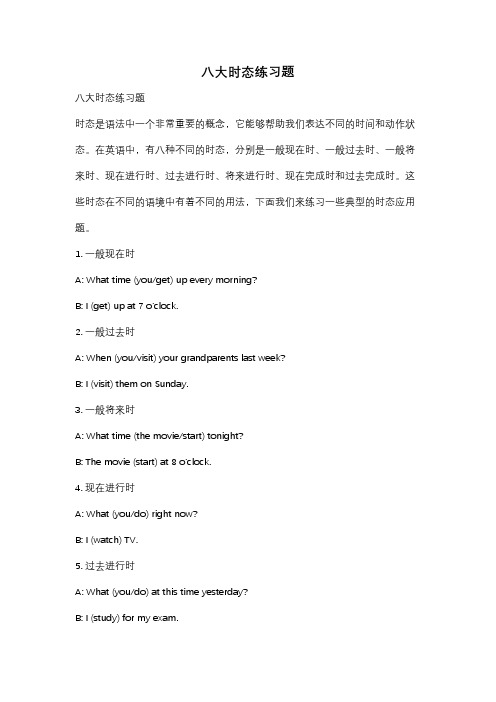
八大时态练习题八大时态练习题时态是语法中一个非常重要的概念,它能够帮助我们表达不同的时间和动作状态。
在英语中,有八种不同的时态,分别是一般现在时、一般过去时、一般将来时、现在进行时、过去进行时、将来进行时、现在完成时和过去完成时。
这些时态在不同的语境中有着不同的用法,下面我们来练习一些典型的时态应用题。
1. 一般现在时A: What time (you/get) up every morning?B: I (get) up at 7 o'clock.2. 一般过去时A: When (you/visit) your grandparents last week?B: I (visit) them on Sunday.3. 一般将来时A: What time (the movie/start) tonight?B: The movie (start) at 8 o'clock.4. 现在进行时A: What (you/do) right now?B: I (watch) TV.5. 过去进行时A: What (you/do) at this time yesterday?B: I (study) for my exam.6. 将来进行时A: What (you/do) this time tomorrow?B: I (work) on a project.7. 现在完成时A: How many books (you/read) so far this year?B: I (read) ten books.8. 过去完成时A: By the time I arrived, they (already/leave).B: Oh no, I (miss) them.这些练习题涵盖了八种不同的时态,让我们更好地理解和掌握它们的用法。
一般现在时用于描述经常性的动作或事实,一般过去时用于过去发生的动作或事情,一般将来时用于表示将来的动作或计划,现在进行时用于描述正在进行的动作,过去进行时用于过去某个时间正在进行的动作,将来进行时用于描述将来某个时间正在进行的动作,现在完成时用于描述过去发生的动作对现在造成的影响,过去完成时用于描述过去某个时间之前已经完成的动作。
初中英语必考八大时态结构及用法详解
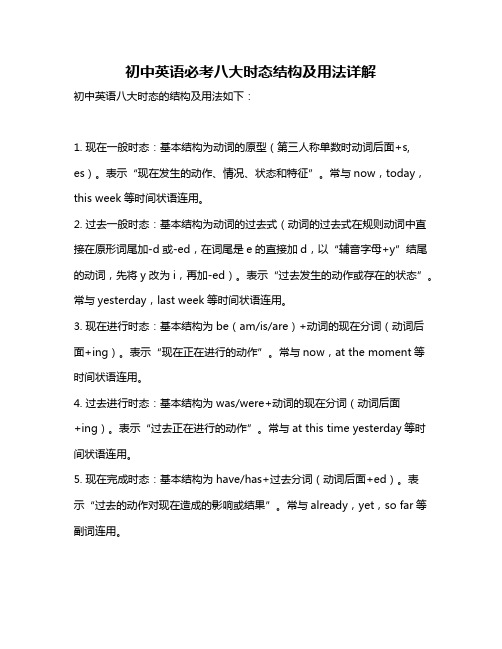
初中英语必考八大时态结构及用法详解初中英语八大时态的结构及用法如下:1. 现在一般时态:基本结构为动词的原型(第三人称单数时动词后面+s, es)。
表示“现在发生的动作、情况、状态和特征”。
常与now,today,this week等时间状语连用。
2. 过去一般时态:基本结构为动词的过去式(动词的过去式在规则动词中直接在原形词尾加-d或-ed,在词尾是e的直接加d,以“辅音字母+y”结尾的动词,先将y改为i,再加-ed)。
表示“过去发生的动作或存在的状态”。
常与yesterday,last week等时间状语连用。
3. 现在进行时态:基本结构为be(am/is/are)+动词的现在分词(动词后面+ing)。
表示“现在正在进行的动作”。
常与now,at the moment等时间状语连用。
4. 过去进行时态:基本结构为was/were+动词的现在分词(动词后面+ing)。
表示“过去正在进行的动作”。
常与at this time yesterday等时间状语连用。
5. 现在完成时态:基本结构为have/has+过去分词(动词后面+ed)。
表示“过去的动作对现在造成的影响或结果”。
常与already,yet,so far等副词连用。
6. 过去完成时态:基本结构为had+过去分词(动词后面+ed)。
表示“过去的动作在过去的某个时间之前已经完成或发生的动作或存在的状态”。
常与by the end of last year,by the time of等时间状语连用。
7. 现在完成进行时态:基本结构为have/has been+动词的现在分词(动词后面+ing)。
表示“动作从过去某时开始,一直延续到现在,或者刚刚完成”。
常与for several days,since等时间状语连用。
8. 过去完成进行时态:基本结构为had been+动词的现在分词(动词后面+ing)。
表示“过去的某个动作从过去某时开始,一直延续到过去的某个时间,或者刚刚完成”。
(完整word版)八大时态综合讲解及专项练习题共八页 打印版范文

英语八大时态详解英语的时态(tense)是一种动词形式,不同的时态用以表示不同的时间与方式。
下面就英语中常见的八种基本时态进行阐述,其它的时态都是在这八种时态的基础上结合而成的。
一、一般现在时:1.概念:经常、反复发生的动作或行为及现在的某种状况。
2.时间状语:always, usually, often, sometimes, every week (day, year, month...), once a week, on Sundays,3.基本结构:动词原形(如主语为第三人称单数,动词上要加(e)S)4.否定形式:am/is/are+not;此时态的谓语动词若为行为动词,则在其前加don't,如主语为第三人称单数,则用doesn't,通常还原行为动词。
5.一般疑问句:把be动词放于句首;用助动词do提问,如主语为第三人称单数,则用does,同时,还原行为动词。
6.例句:It seldom snows here.He is always ready to help others.Action speaks louder than words.二、一般过去时:1.概念:过去某个时间里发生的动作或状态;过去习惯性、经常性的动作、行为。
2.时间状语:ago, yesterday, the day before yesterday, last week(year, night, month…), in 1989, just now, at the age of 5, one day, long long ago, once upon a time, etc.3.基本结构:be动词;行为动词4.否定形式:was/were+not;在行为动词前加didn't,同时还原行为动词。
5.一般疑问句:was或were放于句首;用助动词do的过去式did 提问,同时还原行为动词。
6.例句:She often came to help us in those days.I didn't know you were so busy.三、现在进行时:1.概念:表示现阶段或说话时正在进行的动作及行为。
英语八大时态例句及解析
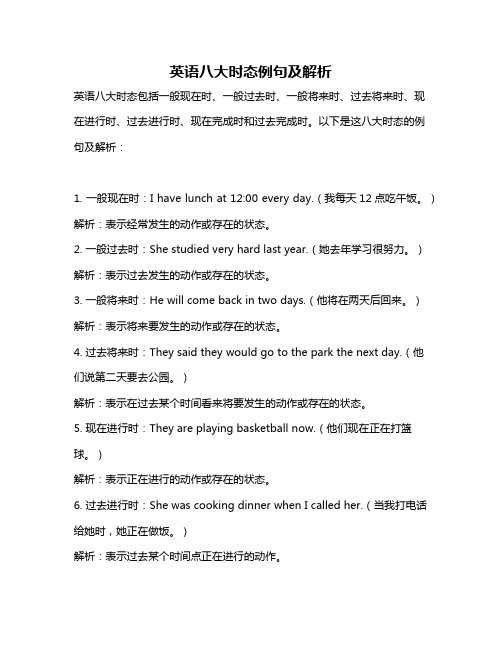
英语八大时态例句及解析英语八大时态包括一般现在时、一般过去时、一般将来时、过去将来时、现在进行时、过去进行时、现在完成时和过去完成时。
以下是这八大时态的例句及解析:1. 一般现在时:I have lunch at 12:00 every day.(我每天12点吃午饭。
)解析:表示经常发生的动作或存在的状态。
2. 一般过去时:She studied very hard last year.(她去年学习很努力。
)解析:表示过去发生的动作或存在的状态。
3. 一般将来时:He will come back in two days.(他将在两天后回来。
)解析:表示将来要发生的动作或存在的状态。
4. 过去将来时:They said they would go to the park the next day.(他们说第二天要去公园。
)解析:表示在过去某个时间看来将要发生的动作或存在的状态。
5. 现在进行时:They are playing basketball now.(他们现在正在打篮球。
)解析:表示正在进行的动作或存在的状态。
6. 过去进行时:She was cooking dinner when I called her.(当我打电话给她时,她正在做饭。
)解析:表示过去某个时间点正在进行的动作。
7. 现在完成时:I have finished my homework.(我已经完成了作业。
)解析:表示已经完成的动作或存在的状态,强调对现在的影响。
8. 过去完成时:They had left before we arrived.(在我们到达之前,他们已经离开了。
)解析:表示在过去的某个时间之前已经完成的动作。
希望能够帮助到您。
如需更多详细信息,建议查阅英语语法书籍或咨询英语教师。
2011年全国中考英语八大试题试题汇编之一现在进行时和一般现在时
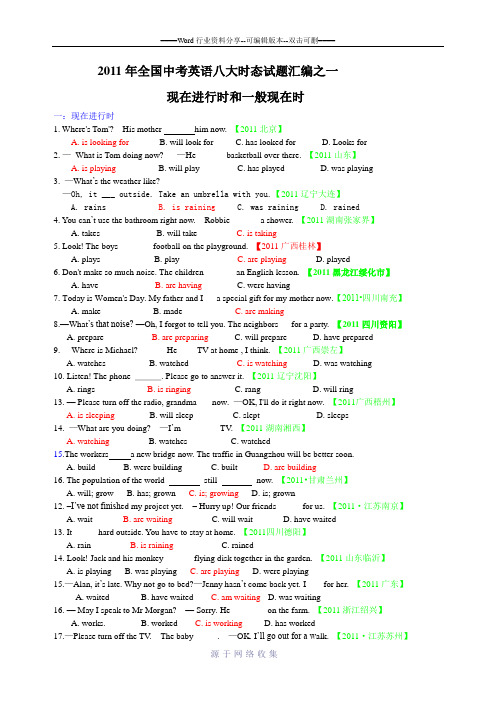
2011年全国中考英语八大时态试题汇编之一现在进行时和一般现在时一:现在进行时1. Where's Tom'? His mother __ him now.【2011北京】A. is looking forB. will look forC. has looked forD. Looks for2.—What is Tom doing now? —He ______ basketball over there.【2011山东】A. is playingB. will playC. has playedD. was playing3. —What’s the weather like?—Oh, it ___ outside. Take an umbrella with you.【2011辽宁大连】A. rainsB. is rainingC. was rainingD. rained4. You can’t use the bathroom right now. Robbie ______ a shower.【2011湖南张家界】A. takesB. will takeC. is taking5. Look! The boys _______ football on the playground. 【2011广西桂林】A. playsB. playC. are playingD. played6. Don't make so much noise. The children _______an English lesson.【2011黑龙江绥化市】A. haveB. are havingC. were having7. Today is Women's Day. My father and I __ a special gift for my mother now.【2011•四川南充】A. makeB. madeC. are making8.—What’s that noise?—Oh, I forgot to tell you. The neighbors __ for a party.【2011四川资阳】A. prepareB. are preparingC. will prepareD. have prepared9.----Where is Michael? ----He ____TV at home , I think.【2011广西崇左】A. watchesB. watchedC. is watchingD. was watching10. Listen! The phone ___. Please go to answer it.【2011辽宁沈阳】A. ringsB. is ringingC. rangD. will ring13. — Please turn off the radio, grandma ___now.—OK, I'll do it right now.【2011广西梧州】A. is sleepingB. will sleepC. sleptD. sleeps14. —What are you doing? —I’m ________ TV.【2011湖南湘西】A. watchingB. watchesC. watched15.The workers _a new bridge now. The traffic in Guangzhou will be better soon.A. buildB. were buildingC. builtD. are building16. The population of the world still now.【2011•甘肃兰州】A. will; growB. has; grownC. is; growingD. is; grown12. –I’ve not finish ed my project yet. – Hurry up! Our friends _____ for us.【2011·江苏南京】A. waitB. are waitingC. will waitD. have waited13. It _____ hard outside. You have to stay at home.【2011四川德阳】A. rainB. is rainingC. rained14. Look! Jack and his monkey ______ flying disk together in the garden. 【2011山东临沂】A. is playingB. was playingC. are playingD. were playing15.—Alan, it’s late. Why not go to bed?—Jenny hasn’t come back yet. I____for her.【2011广东】A. waitedB. have waitedC. am waitingD. was waiting16. — May I speak to Mr Morgan? — Sorry. He ______on the farm. 【2011浙江绍兴】A. works.B. workedC. is workingD. has worked17.—Please turn off the TV. The baby _____. —OK. I’ll go out for a w alk.【2011·江苏苏州】A. sleepsB. sleptC. is sleepingD. was sleeping18.---Where is Grace? ---She __in the yard.【2011浙江温州】A. readsB. readC.is readingD.was reading19. Don’t make so much noise. The children an English lesson.【2011黑龙江齐齐哈尔】A. haveB. are havingC. were having20. Listen! Someone _________ for help!【2011•湖南株洲】A. calledB. is callingC. has called21. The girl with her grandparents for the moment because her parents are both very busythis month.【2011四川绵阳】A. livedB. is livingC. liveD. was living22. A: What’s your brother doing now?B: He is a kite.【2011重庆江津】A. flyB. flyingC. fliesD. flew23. Listen, our teachers ______ Red Songs in the next room.【2011湖南怀化】A. sangB. are singingC. sings24. Mr. Smith works with a mobile phone company, but he _________ for this international meeting,since he is on holiday. 【2011湖北十堰】A. worksB. is workingC. has workedD. had worked25.—Where is your English teacher? I’m looking for him everywhere.—He _____ the Internet in the computer room.【2011江苏泰州】A. will searchB. has searchedC. searchedD. is searching二:一般现在时1.Jenny! Do you know that one-third of the boys in our class______ the singer Zhang Shaohan?【2011贵州遵义】A. likeB. likesC. liking2. The sense of happiness will increase if you ______ what you like to do. 【2011山西】A. doB. didC. will do3. Betty will ring me up when she _______ in Beijing.【2011重庆】A. arriveB. arrivesC. arrivedD. will arrive4. If you _____ your homework, you can go out to play football.【2011四川德阳】A. finishB. will finishC. are finishing5.Now my father _____ his bike to work every day instead of driving.【2011上海】A. rideB. rodeC. ridesD. will ride6. This girl is ready to help people any time. When she is on the bus, she alwaysher seat to someone in need.【2011四川绵阳】A. givesB. giveC. gaveD. giving7. —When will he leave for Shanghai? —As soon as he _ his work.【2011•宁夏】A. finishedB. will finishC. is finishingD. finishes8. A lthough Bill isn’t rich enough, he often ______ money to the poor.【2011山东】A. will giveB. was givingC. givesD. gave9. ----Can your father drive? ----Yes, and he to work every day.【2011湖北襄阳】A. is drivingB. droveC. drivesD. has driven10. John likes playing soccer very much and he _____ about one hour playing it every day.【2011湖北·武汉】A. spent B. will spend C. has spent D. spends。
英语高中八大时态练习题

英语高中八大时态练习题在学习英语的过程中,掌握时态是非常重要的一部分。
时态可以帮助我们准确地描述动作的发生时间,使得我们的表达更加清晰和准确。
本文将向大家介绍英语高中八大时态,并提供相应的练习题,以便帮助大家巩固对时态的理解和应用。
一、一般现在时(Simple Present Tense)一般现在时表示经常性的动作或客观事实,常与时间副词或频率副词连用。
练习题:1. My brother ______________ basketball every Sunday morning. (play)2. She usually ________ her homework after school. (finish)3. They ___________ football every weekend. (play)4. The train __________ at 6 pm every day. (arrive)5. He always ________ his bike to work. (ride)二、一般过去时(Simple Past Tense)一般过去时表示过去发生的动作或状态。
练习题:1. We _________ a picnic yesterday. (have)2. She _________ a book last night. (read)3. I _________ breakfast this morning. (eat)4. They _________ to the museum last week. (go)5. He ____________ in London three years ago. (live)三、一般将来时(Simple Future Tense)一般将来时表示将来某一时刻或某一动作发生。
练习题:1. I ____________ a party next weekend. (have)2. She ________ her friend tomorrow. (visit)3. They ________ to China next year. (travel)4. We _________ our exams in June. (take)5. He ____________ a doctor in the future. (become)四、现在进行时(Present Continuous Tense)现在进行时表示现阶段正在进行的动作。
中考英语八种常见时态精讲精练(精品)
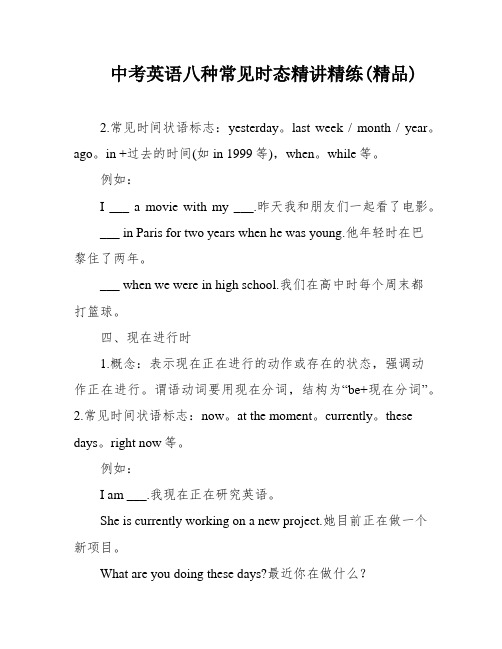
中考英语八种常见时态精讲精练(精品)2.常见时间状语标志:yesterday。
last week / month / year。
ago。
in +过去的时间(如in 1999等),when。
while等。
例如:I ___ a movie with my ___.昨天我和朋友们一起看了电影。
___ in Paris for two years when he was young.他年轻时在巴黎住了两年。
___ when we were in high school.我们在高中时每个周末都打篮球。
四、现在进行时1.概念:表示现在正在进行的动作或存在的状态,强调动作正在进行。
谓语动词要用现在分词,结构为“be+现在分词”。
2.常见时间状语标志:now。
at the moment。
currently。
these days。
right now等。
例如:I am ___.我现在正在研究英语。
She is currently working on a new project.她目前正在做一个新项目。
What are you doing these days?最近你在做什么?五、过去进行时1.概念:表示过去某一时间正在进行的动作,强调过去某个时刻正在进行的动作。
谓语动词要用过去分词,结构为“was / were+现在分词”。
2.常见时间状语标志:at that time。
at 7o’clock yesterday evening。
while。
when等。
例如:I was watching TV when he called me last night.昨晚他打电话给我时,我正在看电视。
They were having dinner at that time.那时他们正在吃晚饭。
She was reading a book while waiting for the train.她在等火车的时候正在看书。
六、现在完成时1.概念:表示过去发生的动作对现在造成的影响或结果,或者强调动作发生在过去,但对现在仍有重要性。
一般现在时态2011中考真题练习

时态练习(二)1。
Jenny! Do you know that one-third of the boys in our class______ the singer Zhang Shaohan?【2011贵州遵义】A. like B。
likes C. liking2。
The sense of happiness will increase if you ______ what you like to do。
【2011山西】A。
do B. did C。
will do3。
Betty will ring me up when she _______ in Beijing.【2011重庆】A. arrive B。
arrives C. arrived D. will arrive4。
If you _____ your homework,you can go out to play football.【2011四川德阳】A。
finish B。
will finish C. are finishing5。
Now my father _____ his bike to work every day instead of driving。
【2011上海】A。
ride B。
rode C. rides D. will ride6。
This girl is ready to help people any time。
When she is on the bus, she alwaysher seat to someone in need.【2011四川绵阳】A。
gives B。
give C. gave D。
giving7。
—When will he leave for Shanghai? —As soon as he _ his work.【2011•宁夏】A。
finished B. will finish C。
is finishing D。
初中英语八大时态之现在完成时和过去完成时
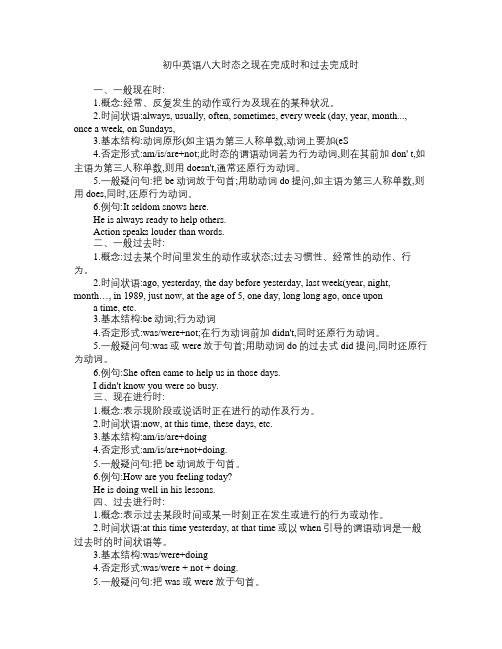
初中英语八大时态之现在完成时和过去完成时一、一般现在时:1.概念:经常、反复发生的动作或行为及现在的某种状况。
2.时间状语:always, usually, often, sometimes, every week (day, year, month..., once a week, on Sundays,3.基本结构:动词原形(如主语为第三人称单数,动词上要加(eS4.否定形式:am/is/are+not;此时态的谓语动词若为行为动词,则在其前加don' t,如主语为第三人称单数,则用doesn't,通常还原行为动词。
5.一般疑问句:把be动词放于句首;用助动词do提问,如主语为第三人称单数,则用does,同时,还原行为动词。
6.例句:It seldom snows here.He is always ready to help others.Action speaks louder than words.二、一般过去时:1.概念:过去某个时间里发生的动作或状态;过去习惯性、经常性的动作、行为。
2.时间状语:ago, yesterday, the day before yesterday, last week(year, night, month…, in 1989, just now, at the age of 5, one day, long long ago, once upona time, etc.3.基本结构:be动词;行为动词4.否定形式:was/were+not;在行为动词前加didn't,同时还原行为动词。
5.一般疑问句:was或were放于句首;用助动词do的过去式did 提问,同时还原行为动词。
6.例句:She often came to help us in those days.I didn't know you were so busy.三、现在进行时:1.概念:表示现阶段或说话时正在进行的动作及行为。
中考初中英语时态总结(八大时态精讲+习题+答案) (3)

中考初中英语时态总结(八大时态精讲+习题+答案)初中英语八大时态全套精讲及练习题.1 一般现在时的用法1) 经常性或习惯性的动作,常与表示频度的时间状语连用。
时间状语:every…, sometimes,ofen,always,usually, twice a week, at…, on SundayI leave home for school at 7 every morning. He watches Tv once a week .2) 客观真理,客观存在,科学事实。
The earth moves around the sun. Shanghai lies in the east of China.3) 表示格言或警句中。
Pride goes before a fall.骄者必败。
注意:此用法如果出现在宾语从句中,即使主句是过去时,从句谓语也要用一般现在时。
例:Columbus proved that the earth is round..4) 现在时刻的状态、能力、性格、个性。
I don't want so much. Ann Wang writes good English but does not speak well.比较:Now I put the sugar in the cup.I am doing my homework now.第一句用一般现在时,用于操作演示或指导说明的示范性动作,表示言行的瞬间动作。
再如:Now watch me, I switch on the current and stand back. 第二句中的now是进行时的标志,表示正在进行的动作的客观状况,所以后句用一般现在时。
二. 构成及变化 1、be动词的变化肯定句:主语+be(am,is,are)+其它。
如:I am a boy.我是一个男孩。
否定句:主语+ be + not +其它。
- 1、下载文档前请自行甄别文档内容的完整性,平台不提供额外的编辑、内容补充、找答案等附加服务。
- 2、"仅部分预览"的文档,不可在线预览部分如存在完整性等问题,可反馈申请退款(可完整预览的文档不适用该条件!)。
- 3、如文档侵犯您的权益,请联系客服反馈,我们会尽快为您处理(人工客服工作时间:9:00-18:30)。
2011年全国中考英语八大时态试题汇编之三现在完成时和过去完成时现在完成时:1. —Dad, I ________ the station for minutes, but nobody came to meet me. 【2011福建泉州】—Don’t worry. I’ll go to meet you soon.A. arrived atB. have been atC. will reach2. —________ you ever _________ Dali? 【2011云南八市】—Never. But I am going there this vacation.A. Do…go toB. Have…been toC. Have…gone toD. Will…go to3. My aunt is a writer. She ____ more than ten books since 1980. 【2011北京】A. writesB. wroteC. has writtenD. will write4.Echo _____ for half a month. She’ll come hack in two months.【2011广东清远】A. left B leave C. has left D. has been away5.The Smiths came to Shanghai in 2008,they__ there for three years since then. 【2011广西百色】A. liveB. livedC. have livedD. will live6. — Have you ever been to Nanning?— Yes, _______ .【2011广西桂林】A. I wasB. I doC. I amD. I have7. I my homework, I guess I can't join you. 【2011河北省】A. don't finishB. didn't finishC. haven't finishedD. won't finish8. —Excuse me, where is Mr. Brown's office? 【2011•河南省】—Sorry, I don't know. I _____ here for only a few days.A. workB. workedC. have workedD. will work9.—Where is Bob?—He ______to Harbin for a meeting.【2011黑龙江绥化市】A. wentB. has beenC. has gone10. — Are you going to the bank, Laura?—No, I ______ to the bank already. 【2011江苏徐州】A. have beenB. have goneC. am goingD. had been11.—Oh, you are here. I’m looking for you all the morning. ?【2011呼和浩特】—To the library.A. Where have you goneB. Where will you goC. Where are you goingD. Where have you been?12. So far this year, many new houses ________ in W enchuan with the help of the government.【2011四川资阳】A. buildB. are builtC. will buildD. have been built13. My grandmother ______ a lot of changes in Tianjin since she came here. 【2011天津】A.sees B. can see C. will see D. has seen14.I many new friends since I came here.【2011贵州毕节】A.make B.made C.will make D.have made15. Mrs. Weng came back from France in 2010. She _____ there for four years. 【2011福建莆田】A. worksB. workedC. has worked16. "Where's your brother, Jane?""He's not in Guiyang these days. He________ Beijing.'【2011贵州贵阳】A. has gone toB. has been toC. had been to17. She _______ this book for nearly three weeks. 【2011四川雅安】A. has borrowedB. has lentC. has boughtD. has kept18. They _____ England and they will be back next week. 【2011四川雅安】A. have gone toB. have been toC. have gone inD. has been on19. He_______ in this city since his family moved to Nanchong. 【2011•四川南充】A. liveB. livedC. has lived20. Some students in Shanghai e-bags for several months. 【2011陕西】A. haveB. have hadC. hadD. will have21.—Is Mr. Smith still in Shanghai? 【2011辽宁本溪】—Yes, he ______ there for two months.A. has beenB. has goneC. has been toD. has gone to22. My brother and I _____ in Yinchuan since 1997.【2011•宁夏】A. had livedB. have livedC. liveD. will live23. My pen pal said he would write to me, but I ___ any letters from him so far. 【2011广西贵港】A. won’t receiveB. haven’t receivedC. hadn’t receivedD. d idn’t receive24. Our country ______the sixth population census(人口普查) already. 【2011广西贺州】A. finishedB. has finishedC. will finishD. finishes25.Thomas ______ the army for two years, so he misses his mother very much. 【2011贵州遵义】A. has joinedB. has taken part inC. has been in26.—How well do you know the Opera House? 【2011江苏泰州】—I know the place very well. I ____ Sydney many times.A. have been inB. have been toC. have gone toD. have arrived in27.A:How clean the bedroom is! 【2011重庆江津】B: Yes, I am sure that someone it.A. cleansB. cleanedC. has cleanedD. had cleaned28.— Where is Ben? —He ____ to the teachers’ office. He will be back soon.【2011·福建福州】A. goB. has goneC. has been29. I ______my hometown for a long time, I really miss it! 【2011重庆】A. leftB. went away fromC. have leftD. have been away from30. —Will you please go to see the movie Guanyinshan with me? 【2011山东聊城】—No, I won’t. I ______ already.A. sawB. have seenC. seeD. will see31.-Where is John?-He ______ the science lab. 【2011四川广安】A. has gone toB. has been toC. went to32.— How do you like your English teacher? 【2011•甘肃兰州】— He is great. We friends since three years ago.A. wereB. have madeC. have beenD. have become33.—Hi, guys. Where are you heading now? 【2011山东威海】—Home. We _________all our money, so we have to walk home now.A. spendB. spentC. have spentD. are spending34. —_____ you _____ the movie Gongfu Panda II ? 【2011四川内江】— Not yet. I'll see it this Sunday.A.Did, seeB.Do, seeC. Have, seen35.British Prince William(威廉王子) and Kate _____ for nearly two months. 【2011江苏淮安】A. marriedB. have marriedC. have been marriedD. have got married36. Jim _________ in Zhuzhou since he finished his college. 【2011•湖南株洲】A. worksB. is workingC. has worked38. —May I speak to Lin Tao? 【2011湖南怀化】—Sorry, he is not in. He ______ to Changsha.A. has beenB. has goneC. went39. He promised to pick me up at the school gate. However. he __ yet. 【2011安徽】A. didn't arriveB. doesn't arriveC. isn't arrivingD. hasn't arrived40. Great changes _________ in Tongren in the past five years. 【2011•贵州铜仁】A. have happenedB. have taken placeC. have been happenedD. have been taken place41. You are too late. The film ______ since half an hour ago. 【2011广东肇庆】A.has begunB. has been onC. began42.—Why won’t you go to the movie with me, Gina?【2011湖北襄阳】—Because I it twice.A. seeB. have seenC. sawD. will see43. -Where's your father, Tom? -He__ to Changsha. 【2011湖南永州】A. goesB. wentC. has gone44. - Where is my sister, mum? - She ______ to the library. She will be back soon. 【2011山东】A. has beenB. is goingC. has goneD. will go45.—May I speak to Mary?【2011 湖南衡阳】—Sorry, she isn’t in. She to Japan and will come back in two weeks.A. has beenB. has goneC. is going46. —Are Li Yan and Wang Mei still living in Pingba? 【2011贵州安顺】—No, they ____ to Shanghai.A. had movedB. movedC. will moveD. have moved47. Mr. Fan ___ this watch in 2005. he ____ it for 6 years. 【2011四川泸州】A .bought, has had B. bought, has C. has bought, has had D. has bought, had48. Mr. White came to our school in 2008, and since then he us English.【2011•江苏盐城】A. teachesB. taughtC. has taughtD. will teach49. —China develops so fast. —That’s true. It ______ a lot already.【2011安徽芜湖】A. changesB. changedC. will changeD. has changed50. - Jim isn’t in the classroom. Where is he?【2011湖北·武汉】- He _____ to the teacher’s office.A. will goB. has goneC. had goneD. is going51. Lanmon ______ here for almost ten years and he has many Chinese friends. 【2011.云南明】A. has beenB. leftC. has comeD. came52.—Have you ever visited Germany? 【2011.云南昆明】—____________. But I expect to go there again.A. PerhapsB. No, I haven’tC. I don’t knowD. Yes, I have53. —May I speak to Miss Wang? 【2011.山东淄博】—Sorry. She isn’t in. She __________ to Hong Kong.A. has beenB. has goneC. goesD.went54. Sam came to Baihai in 2002. He __________ here for nine years. 【2011.广西北海】A. livesB. was livingC. has livedD. will live55. He _____in Xinxiang for five years when I heard his news. 【2011.海南三亚】A. has livedB. had livedC. is livingD. has been lived56.Our school is having a sports meeting. Someone _____ here already. 【2011黑龙江龙东五市】A. arrivedB. have arrivedC. has arrived过去完成时:1. Some students in Shanghai e-bags for several months. 【2011陕西】A. haveB. have hadC. hadD. will have2.The meeting _ by the time I got there yesterday. 【2011乌鲁木齐】A. was onB. has been onC. had begunD. has begun3. By the end of last month, I _____ all the CDs of Justin Bieber. 【2011上海】A. collectB. collectedC. have collectedD. had collected4. By the time I got to the cinema, the movie _______ for ten minutes. 【2011.山东淄博】A. had begunB. had been onC. has startedD. has been on5.By the time I got to the cinema,the movie _______ for ten minutes. 【2011广东河源】A. had begunB. had been onC. has startedD. has been on。
